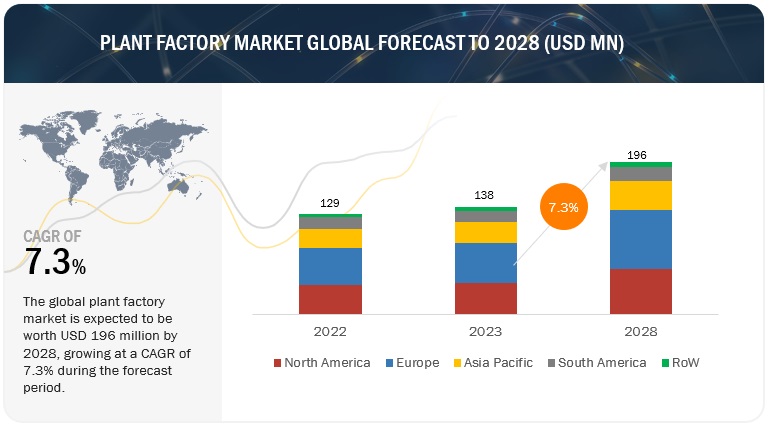The global plant factory market was valued at USD 129 million in 2022 and is expected to expand from USD 138 million in 2023 to USD 196 million by 2028, marking a CAGR of 7.3% over the forecast period (2023-2028). The market’s steady growth is fueled by several key factors, primarily the increasing global population and the need for sustainable food production solutions. Plant factories provide an innovative approach to agriculture, using advanced technology to grow crops in controlled environments, enabling year-round cultivation and higher yields. Additionally, plant factories use significantly less water and land than traditional farming, making them highly appealing for regions with water scarcity and limited arable land. The growing consumer preference for locally sourced, pesticide-free produce also boosts the plant factory market, as these facilities can meet the demand for sustainable, high-quality food. Consequently, the plant factory market is projected to continue its upward trajectory as the demand for sustainable agriculture intensifies.

The plant factory market, also known as vertical farming or indoor farming, has been gaining traction due to several trends shaping the industry. Here are some key trends in the plant factory market:
Technological Advancements: Innovations in hydroponics, aeroponics, and aquaponics are improving crop yields and reducing resource consumption. Advanced sensors and IoT technologies are enhancing monitoring and automation.
Sustainability Focus: There is a growing emphasis on sustainable practices to reduce the environmental impact of agriculture. Plant factories use less water, land, and pesticides compared to traditional farming methods.
Urbanization: As urban populations increase, the demand for local produce is rising. Plant factories offer a solution for growing food in urban areas, reducing transportation costs and carbon emissions.
Food Security: With global food demand projected to rise, plant factories provide a way to grow food year-round, irrespective of climate conditions, thereby enhancing food security.
Investment and Funding: Increased investment from both private and public sectors is driving the growth of the plant factory market. Startups and established companies are receiving significant funding to develop and scale their technologies.
Consumer Awareness and Demand: There is a growing consumer preference for fresh, locally grown produce. Plant factories can cater to this demand by providing fresh greens and herbs directly to consumers.
Integration of AI and Big Data: The use of AI and big data analytics in plant factories helps optimize growth conditions, predict crop yields, and manage resources more efficiently.
Diverse Crop Production: Plant factories are increasingly diversifying the types of crops produced, moving beyond leafy greens to include herbs, fruits, and even flowers.
Regulatory Support: Governments are recognizing the importance of sustainable agriculture and are introducing supportive regulations and incentives for the plant factory industry.
Global Market Expansion: The plant factory market is expanding globally, with significant growth in regions like North America, Europe, and Asia-Pacific, driven by varying consumer preferences and government policies.
Plant Factory Market Drivers: Higher yield as compared to traditional agriculture practices.
To address the growing demand for food and the challenges posed by decreasing cropland and soil fertility, alternative farming techniques like vertical farming have become essential. These methods are helping countries strive toward food self-sufficiency, particularly in regions where limited natural resources and less favorable climates have historically hindered domestic food production and supply. With constraints such as scarce arable land, low-quality soil, and rising food demand, innovative approaches like vertical farming are gaining traction globally. Vertical farming involves cultivating crops in stacked layers, maximizing space while offering year-round, weather-independent production, and significantly reducing water and pesticide usage.
Hydroponic farming, a key component of vertical farming, dramatically reduces water usage compared to conventional methods by directing water specifically to the plants, where only 0.1% of the applied water is absorbed, while the rest is returned to the environment through evapotranspiration. In contrast, traditional farming often results in water waste due to inadequate irrigation, evaporation, and inefficient management. Vertical farming promotes water efficiency, using up to 95% less water than traditional practices. The Columbia University Earth Institute reports that vertical farming requires 70% to 95% less water for plant cultivation than conventional farming approaches.
The full artificial light segment of the plant factory market is expected to experience the highest CAGR during the forecast period.
The full artificial light segment is projected to experience the highest growth rate among light types. Full artificial light, often referred to as LED lighting, plays a vital role in plant factories—indoor farms tailored for commercial crop production. Recent advancements in LED technology have provided precise control over light spectrum and intensity, enabling the optimization of plant growth and enhancing crop yields. This innovation has significantly propelled the plant factory market, facilitating year-round crop production in a controlled indoor setting, unaffected by external weather conditions and seasonal variations.
Download PDF Brochure: https://www.marketsandmarkets.com/pdfdownloadNew.asp?id=199919959
Based on crop type, Vegetables segment are anticipated to dominate the market.
The market is categorized by crop type into vegetables, fruits, flowers and ornamentals, and other crop varieties. Plant factories create optimal growing conditions that yield vegetables with consistent size, color, and flavor while eliminating pesticides and contaminants. By utilizing advanced technologies like hydroponics and aeroponics, these facilities deliver nutrients directly to the plant roots, minimizing fertilizer use and enhancing nutrient absorption efficiency. This results in produce that is free from harmful chemical residues, offering consumers healthier and safer food options.
North America is Expected to Hold the Second-Largest Share of the Plant Factory Market.
North America boasts a vibrant ecosystem of plant factory companies, ranging from innovative start-ups to established enterprises, all dedicated to developing and scaling solutions that cater to the increasing demand for fresh, high-quality produce. One notable example is Plenty, a San Francisco-based vertical farming start-up that leverages machine learning and robotics to enhance plant growth and minimize water usage. Plenty’s facilities can yield crops year-round, achieving up to 350 times the output per square foot compared to traditional farming practices. The company has secured over USD 500 million in funding and collaborates with several major retailers and restaurants to supply locally grown produce.
According to the Agricultural Marketing Resource Centre (2021), greenhouse crops rank among the top 10 commodities in 42 states and are among the top five commodities in 27 states across the USA. Furthermore, ten states account for over two-thirds of nursery crop output from greenhouses, with California contributing approximately 20% of the total. As a result, greenhouse farming is gaining popularity in the United States as an effective way to produce local, fresh vegetables year-round, independent of cold weather conditions.
The key players in this include AeroFarms (US), Gotham Greens (US), BOWERY FARMING INC. (US), Oishii (US), Plenty Unlimited Inc. (US), MIRAI (Japan), Agricool (France), AppHarvest (US), CropOne (UAE) and BrightFarms (US). These players in this market are focusing on increasing their presence through agreements and collaborations. These companies have a strong presence in North America, Asia Pacific and Europe. They also have manufacturing facilities along with strong distribution networks across these regions.
AEROFARMS
AeroFarms builds large indoor vertical farms for baby leafy greens and microgreens based on annual growing production. The key market for its products is New York, US. The company’s produce is locally grown with freshness, flavors, and extensive varieties and of high quality. It holds a significant market experience of over 14 years in aeroponics. Moreover, the company sells its farming technology and systems in both domestic and international markets, which helps the farmers grow pristine products. Also, AeroFarms has its own patented growing technology called patented growing cloth medium. It is developed for seeding, germinating, growing and harvesting leafy greens. Some of the major partners of the company include Meraas (UAE), ADM Capital (China), Wheatsheaf (UK), IKEA (Netherlands), Middleland Capital (US), and Goldman Sachs (US).
GOTHAM GREENS
Gotham Greens is a pioneer in urban indoor agriculture and is one of the key players in the fresh produce and food industries. The company engages in building and operating sustainable greenhouses, thus producing fresh produce for local supply all year round across different cities in America. The company works on a unique hydroponic greenhouse technology fueled by solar power and is climate-controlled perennially. The company’s advancements in machine learning and data analysis benefit the company to constantly monitor crop health and progress by delivering fresh and tasty produce. Its indoor farming facilities function on sun and wind energy, making it a sustainable greenhouse. The company has built and operated sustainable greenhouses in various cities across America.
In Feb 2023, the Public Investment Fund (“PIF”) signed a joint venture agreement with AeroFarms, to establish a company in Riyadh to build and operate indoor vertical farms in Saudi Arabia and the wider Middle East and North Africa (MENA) region. The joint venture is anticipated to enable year-round, sustainable local sourcing of high-quality crops cultivated on AeroFarms’ unique smart agriculture technology (“AgTech”) platform, which helps address more general supply chain issues in the sector.
In Feb 2023, Realty Income Corporation and Plenty Unlimited INC. announced that they have entered into a strategic real estate alliance to support the development of Plenty’s indoor vertical farms. Under the terms of the agreement, Realty Income will acquire and provide development funding for properties that will house Plenty’s indoor farms. These properties leased to Plenty under long-term net leases. The agreement provides for up to USD 1 billion of development opportunities.
In April 2022, Bowery Farming announced a partnership with The Nature Conservancy (TNC) as part of its’ ‘Earth Month Rewild the Land initiative. With this partnership, Bowery is about to restore 50 acres in the U.S. to support conservation efforts in restoring ecosystem biodiversity and spotlight the rewilding movement, which returns retired farmland and other degraded land to Mother Nature.
About MarketsandMarkets™
MarketsandMarketsTM has been recognized as one of America’s best management consulting firms by Forbes, as per their recent report.
MarketsandMarkets™ is a blue ocean alternative in growth consulting and program management, leveraging a man-machine offering to drive supernormal growth for progressive organizations in the B2B space. We have the widest lens on emerging technologies, making us proficient in co-creating supernormal growth for clients.
Earlier this year, we made a formal transformation into one of America’s best management consulting firms as per a survey conducted by Forbes.
The B2B economy is witnessing the emergence of $25 trillion of new revenue streams that are substituting existing revenue streams in this decade alone. We work with clients on growth programs, helping them monetize this $25 trillion opportunity through our service lines – TAM Expansion, Go-to-Market (GTM) Strategy to Execution, Market Share Gain, Account Enablement, and Thought Leadership Marketing.
Built on the ‘GIVE Growth’ principle, we work with several Forbes Global 2000 B2B companies – helping them stay relevant in a disruptive ecosystem. Our insights and strategies are molded by our industry experts, cutting-edge AI-powered Market Intelligence Cloud, and years of research. The KnowledgeStore™ (our Market Intelligence Cloud) integrates our research, facilitates an analysis of interconnections through a set of applications, helping clients look at the entire ecosystem and understand the revenue shifts happening in their industry.
Media Contact
Company Name: MarketsandMarkets™ Research Private Ltd.
Contact Person: Mr. Rohan Salgarkar
Email: Send Email
Phone: 18886006441
Address:1615 South Congress Ave. Suite 103
City: Delray Beach
State: FL 33445
Country: United States
Website: https://www.marketsandmarkets.com/Market-Reports/plant-factory-market-199919959.html
Press Release Distributed by ABNewswire.com
To view the original version on ABNewswire visit: Plant Factory Market Insights: Key Players, Future Opportunities, Latest Trends, Key Segments, and Revenue Forecast
